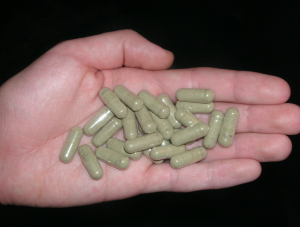It’s important to note that research on kratom’s effectiveness at managing diabetes is still ongoing. However, the herb’s analgesic and anti-anxiety properties are in the public domain.
Kratom, scientifically known as Mitragyna speciosa, refers to a tropical evergreen tree that belongs to the coffee family. It’s used to treat a wide range of medical conditions. Kratom is indigenous to various countries in Southeast Asia, including Indonesia, Thailand, Malaysia, Papua New Guinea, and Myanmar.
While Kratom’s popularity in the West peaked around the dawn of the 21st century, the herb has been used from time immemorial as traditional medicine, mostly in Asian countries. As a medicinal herb, kratom is mostly prescribed for pain relief, where studies have shown that it’s most effective with nociceptive pains. The herb is also used to relieve insomnia, modulate moods, as well as treat various anxiety disorders.
Experts also recommend kratom for the treatment of opioid withdrawals. That’s mainly because the herb imitates the effects of opioid drugs, such as heroin and morphine. But unlike these drugs, kratom doesn’t bind fully to opioid receptors, which makes it less addictive.
Let’s explore how this herb can be used to manage diabetes.
What Is Diabetes?
Diabetes is a disease that results from abnormally high levels of glucose or sugar in the blood. Blood glucose is the primary source of energy in your body. A hormone known as insulin plays a crucial role in helping your body convert the glucose from the food that you eat into a form that can be assimilated by various cells. Insulin is secreted by the pancreas.
Now, it may happen that the pancreas either secretes very little insulin or doesn’t secrete the hormone at all. It could also happen that your body doesn’t use the insulin secreted efficiently. The net effect is that glucose stays in your blood instead of reaching the intended cells. That may trigger a wide spectrum of other conditions, such as kidney disease, eye and foot problems, heart disease, nerve damage, and dental problems.
There are different forms of diabetes, namely:
- Type 1 Diabetes – Occurs when your body doesn’t secret any insulin. Type 1 Diabetes is more common among young people, and patients must take daily doses of insulin to stay alive.
- Type 2 Diabetes – In Type 2 Diabetes, your body doesn’t produce or use insulin efficiently. Type 2 Diabetes is the most common type of diabetes.
- Gestational Diabetes – Develops during pregnancy. Though it usually goes away after delivery, gestational diabetes is a risk factor for type 2 diabetes.
- Monogenic Diabetes – Results from a genetic predisposition.
- Cystic Fibrosis-related Diabetes – Is triggered by cystic fibroids.
According to the National Institute of Diabetes and Digestive and Kidney Diseases, over 30 million Americans are diabetic. Presently, the condition doesn’t have a cure and can only be managed.
Kratom to the Rescue
One of the reasons experts recommend kratom for diabetes is that it’s an all-natural remedy, making it an excellent alternative to conventional medications that tend to present side effects and risks of dependency.
But just how does kratom help to manage diabetes?
- Kratom Treats Anxiety
Diabetes is almost always symptomized by spikes in blood pressure, and high blood pressure is closely associated with anxiety.
When you’re stressed, your liver responds by releasing high amounts of glucose into your bloodstream. But since you’re already diabetic, the excess glucose simply stays in your blood, making you prone to high blood pressure.

By taking kratom pills, you relieve anxiety and, in turn, keep your blood pressure in check. The two active ingredients in kratom, known as mitragynine and 7-hydroxymitragynine, relieve anxiety by binding to certain opioid receptors located in the brain. Kratom delivers similar effects to opioid drugs. However, it doesn’t bind fully to your opioid receptors. That explains why you can use the herb continually to relieve anxiety without developing tolerance and dependency.
The best kratom strains for relieving anxiety and modulating blood pressure are found in the Red family.
- Kratom Relieves Pain
Diabetic patients often suffer from chronic pain. Since chronic pain affects the entire body, it tends to trigger spikes in blood pressure.
According to an FDA study, kratom relieves pain by binding to the mu-opioid receptors. When activated, mu-opioid receptors mediate positive reinforcement, resulting in pain relief.
Research on kratom as a potent analgesic is largely a work in progress. However, various surveys and anecdotal accounts paint a picture of a very effective pain-relieving herb. In many of these surveys, most respondents hailed kratom for its ability to treat pain without inducing dependency.
Kratom strains in the white family are particularly excellent at alleviating the aches associated with diabetes.
- Kratom Suppresses Appetite
Diabetes patients are encouraged to monitor their diets. They should particularly try to suppress their cravings for sugary foods.
Looking into the CGM medicare requirements to see if they’re eligible for glucose monitors would be beneficial. They should also strive to keep their cholesterol levels in check. Kratom helps with both.
Most of the foods that we eat end up as glucose. So, the more you eat, the higher your body’s blood glucose level. That also comes with a proportionate demand for insulin, which your body is already struggling to secrete.
Kratom has been used as an appetite suppressant for many years, especially among people who’re trying to watch their weight. By curbing your appetite, kratom manages your diabetic condition while also helping you to keep obesity at bay.
- Kratom Boosts Your Energy
Doctors always emphasize the need for exercise, especially among people with diabetes. However, where will a diabetic get all the energy to work out when glucose stays in their bloodstream instead of reaching their body cells?
Well, kratom makes that possible, thanks to its psychoactive properties. The herb induces euphoria. The euphoric effects of kratom not only help users banish their worries and fears, but it also gives them bursts of energy.
When in a state of euphoria, a person tends to use the sudden rush of energy that their body receives to do the things that make them happy. And working out is one of those things. With a regular dose of kratom powder, diabetics can exercise the same way healthy folks do.
It’s important to note that research on kratom’s effectiveness at managing diabetes is still ongoing. However, the herb’s analgesic and anti-anxiety properties are in the public domain. And diabetics can greatly benefit from these and many other officially-documented medicinal properties of kratom.
[Editor’s note: This is not to be construed as medical advice. Legal Reader disclaims any and all responsibility for results found when/if using this plant. We recommend you consult your doctor/healthcare provider before beginning any supplementation regimen].


Join the conversation!